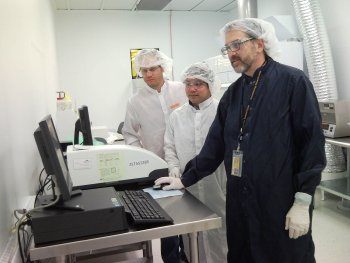Particle characterization using the Zetasizer Nano is a growing area of demand among a whole arsenal of research methods available for use at the Nanotechnology Research Center (NRC) at the Georgia Institute of Technology in the USA.
Initially chosen for this multi-user facility because it was the dynamic light scattering system most familiar to external users and students alike, the Zetasizer Nano from Malvern Panalytical was installed in November 2010. Cost and user service also played a part in its selection. Since its installation, the instrument's ease of use and wide range of applications for particle size, molecular weight, and zeta potential measurement have been drawing in new users and making the instrument increasingly popular among a growing number of users.
 The increasingly popular Malvern Panalytical Zetasizer Nano at the Nanotechnology Research Center (NRC), Georgia Institute of Technology.
The increasingly popular Malvern Panalytical Zetasizer Nano at the Nanotechnology Research Center (NRC), Georgia Institute of Technology.
"We have had several researchers become new NRC users because they want to access our Malvern Panalytical Zetasizer Nano," said Dr David Gottfried, the Senior Research Scientist responsible for managing this tool at Georgia Tech's NRC.
"As a multi-user resource facility for external users as well as Georgia Tech students, we have provided training and consultation on the Zetsizer Nano to nearly 20 individuals so far," explained Dr Gottfried. "We encourage users to be as independent as possible. The fact that Zetasizer Nano measurements are software driven means that there's nothing to adjust. I can therefore give users unaided access in a short period of time knowing that the learning curve is short. They only come to us when they need help. The Zetasizer Nano is so easy to use that, following a brief introduction, I often don't hear from them again."
Used in a wide variety of projects, some of the NRC's Zetasizer Nano recent applications include the development of liposomes for drug delivery, optimization of magnetic nanoparticles for use in cancer treatment, and the analysis of micron-sized inorganics such as hematite (iron oxide).
Georgia Tech's NRC began life 25 years ago as a microelectronics facility, before being expanded in scope to fill the research gap between what is now recognised as nanotechnology and the life sciences. Now three times larger than the original laboratory, the NRC is located in the University's Marcus Nanotechnology Building, named after Bernie Marcus, co-founder of Home Depot who donated to its construction.
Zetasizer Nano particle characterization systems from Malvern Panalytical measure particle size, zeta potential and molecular weight. Applications range from characterizing high concentration colloids and nanoparticles, through to measurement of dilute proteins and macromolecules in their native state, requiring as little as 12 microlitres of sample.